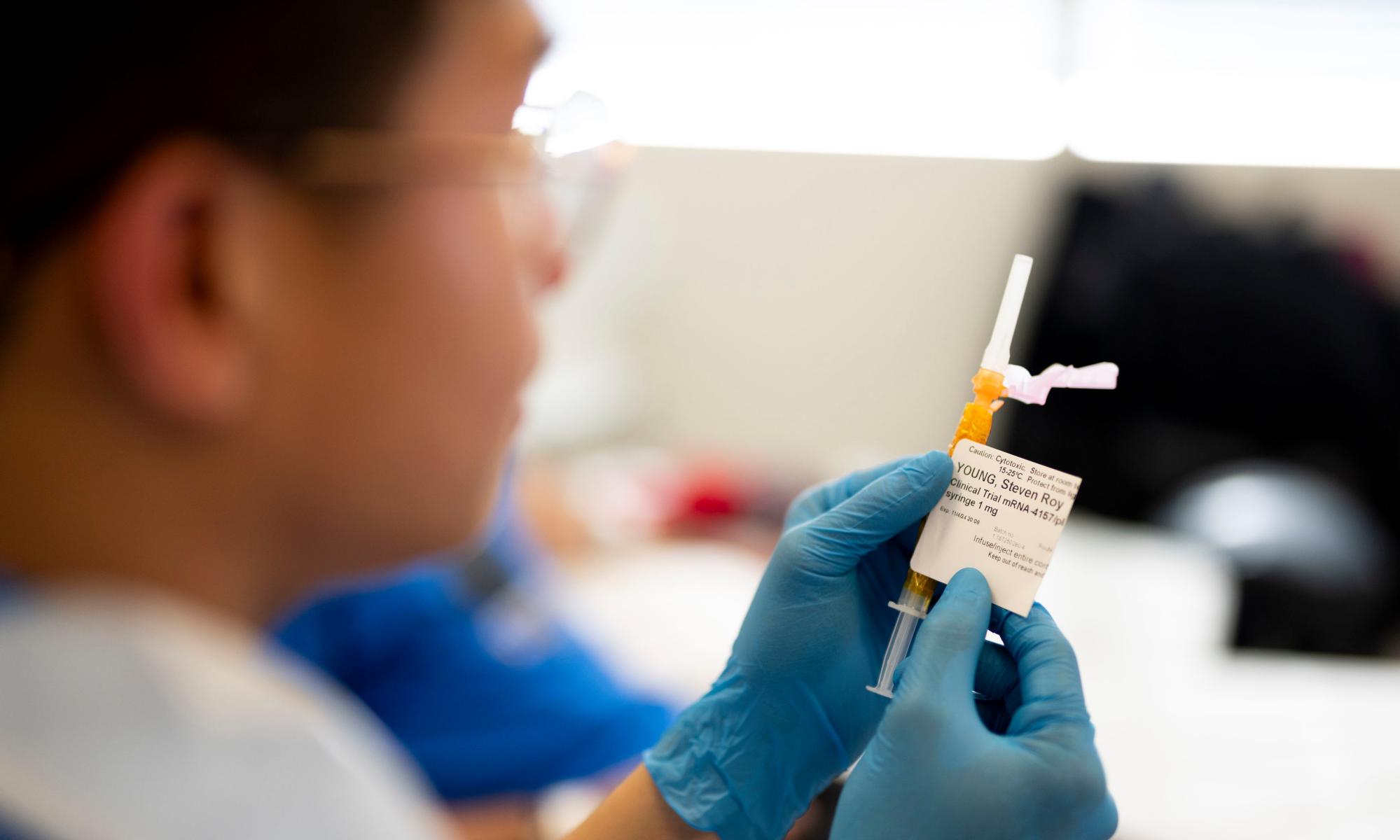
A nurse prepares to give Steve Young, one of the first patients in the trial, his first jab at UCLH in London. Photograph: Jordan Pettitt/PA
Doctors have begun trialling in hundreds of patients the world’s first personalised mRNA cancer vaccine for melanoma, as experts hailed its “gamechanging” potential to permanently cure cancer.
Melanoma affects about 132,000 people a year globally and is the biggest skin cancer killer. Currently, surgery is the main treatment although radiotherapy, medicines and chemotherapy are also sometimes used.
Now experts are testing new jabs that are custom-built for each patient and tell their body to hunt down cancer cells to prevent the disease ever coming back.
A phase 2 trial found the vaccines dramatically reduced the risk of the cancer returning in melanoma patients. Now a final, phase 3, trial has been launched and is being led by University College London Hospitals NHS Foundation Trust (UCLH).
Dr Heather Shaw, the national coordinating investigator for the trial, said the jabs had the potential to cure people with melanoma and are being tested in other cancers, including lung, bladder and kidney.
“This is one of the most exciting things we’ve seen in a really long time,” said Shaw. “This is a really finely honed tool. To be able to sit there and say to your patients that you’re offering them something that’s effectively like the Fat Duck at Bray versus McDonald’s – it’s that level of cordon bleu that’s coming to them … The patients are really excited about them.”
The vaccine is an individualised neoantigen therapy. It is designed to trigger the immune system so it can fight back against a patient’s specific type of cancer and tumour.
Known as mRNA-4157 (V940), the vaccine targets tumour neoantigens, which are expressed by tumours in a particular patient. These are markers on the tumour that can potentially be recognised by the immune system.
The jab carries coding for up to 34 neoantigens and activates an anti-tumour immune response based on the unique mutations in a patient’s cancer.
To personalise it, a sample of tumour is removed during the patient’s surgery, followed by DNA sequencing and the use of artificial intelligence. The result is a custom-built anti-cancer jab that is specific to the patient’s tumour.
“This is very much an individualised therapy and it’s far cleverer in some senses than a vaccine,” said Shaw. “It is absolutely custom-built for the patient – you couldn’t give this to the next patient in the line because you wouldn’t expect it to work.
“They may have some shared new antigens, but they’re likely to have their own very individual new antigens that are important to their tumour and so, therefore, it is truly personalised.”
The ultimate aim to permanently cure patients of their cancer, Shaw said. “I think there is a real hope that these will be the gamechangers in immunotherapy,” she said.
Phase 2 data found people with serious high-risk melanomas who had the jab alongside the immunotherapy Keytruda were almost half (49%) as likely to die or have their cancer come back after three years than those who were given only Keytruda.
Patients received 1mg of the mRNA vaccine every three weeks for a maximum of nine doses, and 200mg of Keytruda every three weeks (maximum 18 doses) for about a year.
The phase 3 global trial will now include a wider range of patients, and aims to recruit about 1,100 people. The UK arm aims to recruit at least 60 to 70 patients across eight centres, including in London, Manchester, Edinburgh and Leeds.
One of the first patients on the trial at UCLH is Steve Young, 52, from Stevenage in Hertfordshire. “I’m really, really excited,” he said. “This is my best chance at stopping the cancer in its tracks.”
News Related-
High court unanimously ruled indefinite detention was unlawful while backing preventive regime
-
Cheika set for contract extension as another Wallabies head coaching candidate slips by
-
Analysis-West's de-risking starts to bite China's prospects
-
'Beyond a joke' Labor won't ensure PTSD protections: MP
-
Formula One season driver ratings: Lando Norris shines as Max Verstappen nears perfection
-
Catalina golfer Tony Riches scores Guinness World Record four holes in one on same hole
-
Florida coach Billy Napier fires assistants Sean Spencer, Corey Raymond with expected staff shakeup ahead
-
Rohingyan refugee NZYQ accidentally named in documents published by high court
-
Colorado loses commitments of 2 more high school recruits
-
Queensland Health issues urgent patient safety alert over national bacteria outbreak
-
Townsville Community Pantry 'distressed' by fruit, vegetable waste at Aldi supermarket
-
What Is The Beaver Moon And What Does It Mean For You?
-
Labor senator Pat Dodson to resign from politics due to health issues
-
Hamas releases 11 more hostages, as Israel agrees to extend ceasefire
